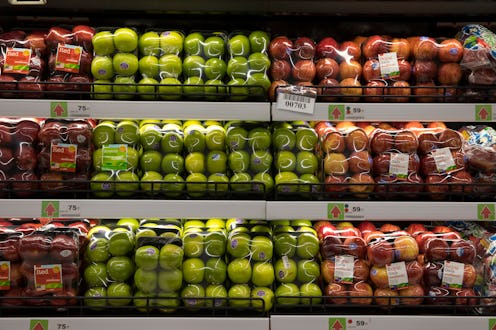
I clean out my fridge every two weeks — and usually toss a fair amount of stuff. I try to be conscious of my consumption, but I often forget about the leftovers in my kitchen. I like to think I do a good job when it comes to food waste, but the truth is, there's so much food is wasted in the U.S. A new study says Americans waste 150,000 tons of food daily, which is about a pound of food a day per person. Researchers from the U.S. Department of Agriculture analyzed years of government data about food to determine how much food we actually waste each day. The study was published in journal PLOS One.
Why does food waste matter? Not only are we wasting our money on stuff that's just going into the compost, but we're also harming the environment. The study says that irrigation and pesticides are wasted on food that ends up in the trash. Fruit and vegetables, dairy and meat make up nearly 70 percent of the food thrown away in the U.S., with fruit and vegetables leading the way. It's generally known that a produce or plant-based diet is better for the environment, but researchers say it's important to not waste the produce you're purchasing. "Consumers should increase their consumption of fruits and vegetables and simultaneously waste less of them," the study says.
Eating fresher foods doesn't mean you're off the hook, and you could be wasting more than someone who typically eats packaged foods. The researchers conclude that people need to be educated on how to properly store fruits and vegetables. Thankfully, you can be proactive about food waste — with Earth Day only a few days away, it's a perfect time to implement some changes to generate less waste and help the environment.
1Don't Buy In Bulk
It can be tempting to fill your shopping cart with all of the things you need for the next month and a half, but bulk shopping actually leads to more waste. According to a study from the University of Arizona, bulk buying also leads to shoppers spending money unnecessarily because you end up throwing away so much of the food you purchase. The Arizona researchers recommend shopping more frequently to save money, and this study emphasizes the same point. Although buying in bulk can save you money, it's actually a financial drain if the stuff you're buying isn't ever eaten.
2Actually Eat Your Leftovers
You know that feeling when you open the refrigerator and everything looks unappealing? I'm guilty of just ordering takeout if I'm not in the mood for what I already have, but one way to reduce waste is to eat food before it spoils. If you're seriously averse to eating leftovers, you should be conscious of how much food you're buying and making, and it may be a good idea to think about cooking more frequently. It sounds draining, but it's doable — Australian lifestyle site Good Food has a guide for people who want to cook every day. They recommend planning ahead, prepping food on weekends, and keeping staples in your pantry to avoid unnecessary grocery trips.
3Don't Let The Expiration Date Freak You Out
I once got food poisoning from expired coffee creamer, so I'm super hesitant about eating food that is past its expiration date. But expiration dates aren't actually scientific guidelines. According to Consumer Reports, manufacturers usually estimate how long their food will remain fresh and use that as a metric to determine expiration dates, but they aren't subject to federal regulation.
Instead of throwing something out because it expired last week, trust your senses. Examine foods to see if they look or smell bad, and visit FoodSafety.gov if you're unsure about how long food is good for. Most of us are guilty of contributing to the food waste problem in the U.S., but you can make small changes that actually make a difference in the long run. The next time you clean out your fridge, think about how much stuff you're actually tossing. You may be surprised.